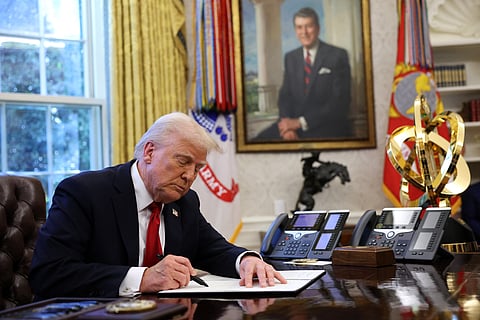Netflix, Disney shares slip on US tariff threat on foreign films
Trump aims to revive US filmmaking amid rising global competition

Shares in US media and entertainment companies fell on Monday after President Donald Trump announced that he plans to impose a 100% tariff on films produced overseas.
In a post on Truth Social, the American leader said he was directing the Commerce Department and his trade representative to “immediately begin the process of instituting” the levy on foreign movies. “WE WANT MOVIES MADE IN AMERICA, AGAIN!” Trump continued.
The president also positioned foreign productions as a national security threat, saying other nations were using films for messaging and propaganda.
Netflix Inc. and Warner Bros. Discovery Inc. fell about 3% while Paramount Global and Walt Disney Co. slid about 2% as markets opened.
Trump’s post followed meetings that the president had over the weekend with actor Jon Voight and his manager, Steven Paul. They met with Trump at his Mar-a-Lago Club, according to people familiar with their visit who asked to not be identified because the discussions were private.
Voight and Paul presented the president with their plans for more federal tax incentives for US film and TV production. Their proposals included expanding existing tax credits and bringing back ones that have expired. The Voight group didn’t propose tariffs as part of their plan, but the president talked about those levies at their meetings. No specifics on the tariffs were discussed.
In January, Trump appointed Voight along with actors Mel Gibson and Sylvester Stallone to be special ambassadors to Hollywood with the goal of boosting US jobs.
It’s not clear how such a tariff would work, nor how such movies would be valued for tariff collection purposes. Many films from Hollywood studios involve global production, including shooting locations in foreign countries and post-production work that can be done anywhere in the world. Other unanswered questions include whether the fee applies to films already shot, but not yet released, or only new productions.
Upcoming releases that include extensive foreign locales include Disney’s The Fantastic Four: First Steps, which was shot in the UK and Spain, and Universal Pictures’ Jurassic World Rebirth, with locations in Thailand, the UK, Malta and the US.
And many big-budget Hollywood films in the past have been partially or largely filmed outside the US. One of the biggest grossing US movies, 2009’s Avatar, was primarily shot in New Zealand while Avengers: Endgame made extensive use of international locations, including Scotland and the UK.
“If this is deployed on a wide scale, it may end up harming the very industry it is supposed to help, especially given that the US exports 3x the amount of content that it imports,” analysts at Barclays wrote in a note to investors on Monday. The analysts noted that media stocks like Netflix “had been seen as defensive due to lack of exposure to tariff-related threats.”
Film and TV work in the US has contracted in recent years for a number of reasons. Media companies have cut back on spending in an attempt to boost profits as they shifted from traditional TV to streaming services. Those streaming services are expanding globally and looking to produce more films for foreign markets.
Spending on film and TV production in the US fell 28% between 2021 and 2024, according to data from the research firm ProdPro. Other countries, such as Canada, Australia, and the UK, are seeing an increase in film and TV production, due in part to attractive tax incentives and lower production costs.
The Motion Picture Association trade group didn’t respond to a request for comment outside of regular working hours.
New Zealand, Australia
Irene Gardine, president of the New Zealand screen producers guild Spada, said Trump’s statement was confusing.
“Does he mean NZ-produced movies couldn’t be released in the US without a 100% tariff? Or does he mean American-produced movies that are shot here (and elsewhere) will be targeted?” she asked. “Either way it would be a terrible shame. We love having American productions working here.”
New Zealand’s Prime Minister Christopher Luxon also commented that the country’s film industry has “amazing people, it’s got incredible technology, great jobs and we’re going continue to advocate very strongly for it.”
New Zealand has served as a filming location for a number of US movies due to its dramatic landscapes and production incentives. The Lord of the Rings Trilogy and The Hobbit Trilogy were filmed extensively across the nation’s north and south islands.
In Australia, lobby group Screen Producers Australia, which represents more than 750 businesses, predicted the announcement would “send shockwaves worldwide.”
Trump’s action follows a move by China last month to “moderately reduce” the number of Hollywood films allowed in the country in retaliation for Trump’s aggressive tariffs on the US rival. The China Film Administration said in April that the restrictions would “inevitably further reduce the domestic audience’s favorability toward American films.”
While the US film industry is the most influential in the world, foreign films have seen a rise in popularity in recent years, drawing award-winning acclaim. The South-Korean thriller Parasite, for instance, won four Academy Awards, including the coveted Best Picture category in 2020.
Sign up for the Daily Briefing
Get the latest news and updates straight to your inbox







